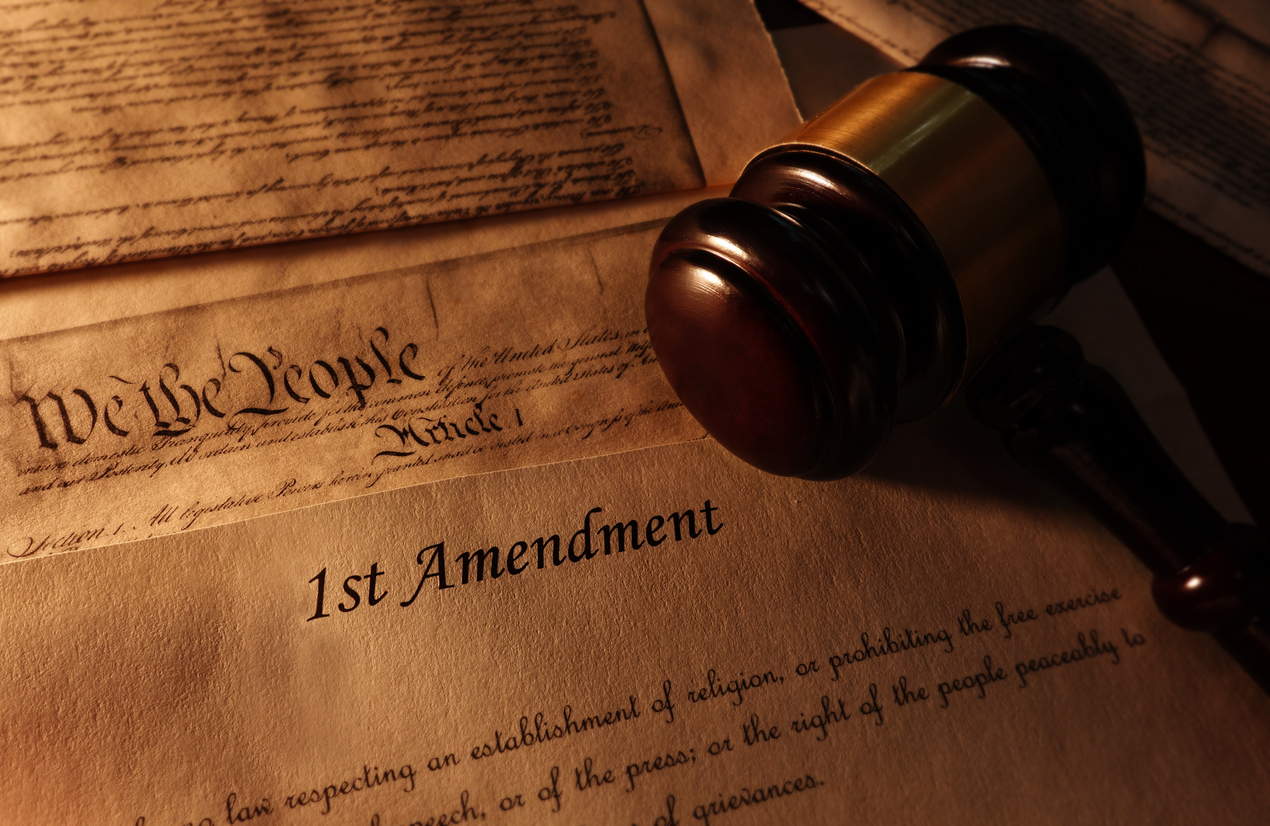What Do Faith-Based Nonprofits Need to Know About State Employment Discrimination Laws?
By Napa Legal Staff
Faith-based organizations should be free to exercise their religion. This freedom must include the ability to model a community of faith through the recruitment, hiring, and retention of employees committed to living in accordance with the organization’s beliefs.1 The legal roots of this freedom are derived from the First Amendment, especially the Ministerial Exception, which prevents the government from interfering with a religious organization’s selection of ministers. But beyond the Ministerial Exception, most employment protections for faith-based nonprofits come from state law.
State laws sometimes restrict the freedom of religious organizations to hire according to their beliefs in significant and destructive ways. For example, state law may allow adverse action against faith-based employers who incorporate faith commitment into their hiring criteria. State law might also favor certain belief systems over others.
Note that there are federal employment laws that affect employment matters for religious organizations, regardless of which state they operate in. Additionally, there may be local employment ordinances at the municipal or county level. This blog post (and the Faith and Freedom Index scoring criteria based on these laws) addresses only the state employment law; federal and local employment laws may be relevant to your organization’s employment decisions as well.2
To understand these state laws and how they may affect religious organizations, you should understand what types of nondiscrimination laws exist, which ones are most likely to conflict with the employment practices of faith-based nonprofits, and the types of exemptions that may be available.
What Types of Employment Nondiscrimination Laws Are Out There?
Generally, state employment nondiscrimination laws have a couple of elements. The statute will explain who counts as an employer for purposes of the statute, what employment practices are subject to the laws, and what classes are protected by the laws.
The definition of “employer” is important. Some states will explicitly exclude religious organizations, associations, and institutions from the definition of employer. If this is the case in your state, the employment nondiscrimination laws likely do not apply to your faith-based nonprofit. Also note that some states only include in the definition of “employer” organizations that have a certain number of employees, which may exclude some small organizations from the laws as well.
Nondiscrimination laws will usually apply broadly to all types of employment decisions, not just hiring and firing. For example, California’s nondiscrimination law does not allow employers “to refuse to hire or employ the person or to refuse to select the person for a training program leading to employment, or to bar or to discharge the person from employment or from a training program leading to employment, or to discriminate against the person in compensation or in terms, conditions, or privileges of employment” on the basis of protected class status.3 States have different ways of wording the protections, and some are broader than others. Be sure to read the scope of the employment actions that are covered in your state.
Finally, it is very important to know which protected classes your state includes in its employment laws. Some states have very narrow categories of protected classes, focusing only on discrimination on the basis of age, race, or ethnicity. Other states on the other end of the spectrum may have quite a wide variety of protected classes. Again, see California, which forbids employment discrimination on the basis of “the race, religious creed, color, national origin, ancestry, physical disability, mental disability, medical condition, genetic information, marital status, sex, gender, gender identity, gender expression, age, sexual orientation, or military and veteran status of any person.”
Which Laws Are Mostly Likely To Affect My Organization?
Assuming that the laws in your state do not exclude religious organizations, the next important consideration is which types of nondiscrimination laws might affect your organization.
Clearly, many prohibitions on discrimination in employment practices will not affect religious organizations. A religious organization practicing its faith will not require employment practices that discriminate on the basis of factors such as race, ethnicity, ancestry, or age.
Generally, there are two types of nondiscrimination provisions that tend to conflict with the employment practices of religious organizations. The first is the prohibition against discrimination on the basis of religion. The second is the inclusion of sexual orientation and/or gender identity status as protected classes.
Laws that prevent discrimination on the basis of religion are often a good thing. We don’t want people being fired from employment or denied promotions in a secular company simply because the employer does not like members of a certain religion. But in the context of employment practices by religious organizations, this becomes a very different issue. Religious organizations need to practice and witness to their faith in everything they do. That requirement means employment decisions often need to be made based on religious identity, belief, or practice. Catholic schools should be free to hire only Catholic employees; Jewish community centers should be free to hire only Jewish employees.
Beyond hiring co-religionists, religious organizations should be able to hire, not only those who are members of the same religion, but those who follow certain core religious teachings and practices. For example, a Catholic school may choose to hire not only Catholics, but Christians of any denomination who adhere to certain core Christian beliefs. Some states, like Texas, have only a narrow co-religionist exemption allowing religious organizations to “[limit] employment or giv[e] a preference to members of the same religion.” Other states like Florida have a broader exemption that allows religious organizations to prefer not only members of the same religion but also “persons who subscribe to [the organization’s] tenets or beliefs.” If an organization wants to hire based not on denominational affiliation but on the religious beliefs held by the applicants, the difference between the Texas statute and the Florida statute might lead to very different outcomes.
After the US Supreme Court decided Bostock v. Clayton County in 2020, discrimination on the basis of sex is now interpreted to include sexual orientation and gender identity for purposes of Title VII of the Civil Rights Act. This is a federal law, but several states have followed Bostock and interpreted their own sex discrimination statutes to include sexual orientation and gender identity as well.
Laws that include sexual orientation or gender identity as protected classes for employment also create religious liberty issues. Many religions have teachings about the human person, sex, and marriage that are deeply at odds with the modern secular understanding of sexual orientation and gender identity. If a person is in a same-sex relationship or “identifies” as a gender other than his God-given sex, these actions often contradict the core beliefs of a religious organization and therefore hinder the organization’s witness to its faith.
Because nondiscrimination laws related to religion, sexual orientation, and gender identity often conflict with the employment practices of religious organizations, it is important to understand the exemptions that may be available in your state to protect your religious liberty in these areas.
What Types of Exemptions Are Available To Religious Organizations?
As we pointed out above, some states exclude religious organizations from the definition of employer, which effectively exempts all religious organizations from these nondiscrimination laws. But this is not the norm. In the states where employment nondiscrimination laws do apply to religious organizations, what exemptions might be available? This varies by state, but the two most common types of exemptions correspond to the two problematic applications of nondiscrimination laws explained earlier.
First, many states have “co-religionist” exemptions – we briefly mentioned this type of exemption in the Texas and Florida examples above. A narrow co-religionist exemption (see Texas) means that, despite what the nondiscrimination laws prohibit, it is not employment discrimination for a religious organization to prefer members of its own religion when making employment decisions. Some co-religionist exemptions go further (see Florida), allowing the religious organization not only to consider the employee/applicant’s religion, but expressly allow the organization to follow the tenets of its religion in establishing and utilizing criteria for employment of an employee. This broader version is helpful because it allows an organization to consider not only the religion with which the applicant/employee identifies, but likely also covers beliefs and behaviors associated with the organization’s religion that the organization thinks is important for employees to have.
Second, some states have exemptions for religious organizations related to nondiscrimination laws that include sexual orientation and gender identity as protected classes. How broad or narrow these exemptions are may vary. Some state laws may simply exempt religious organizations from employment discrimination laws related to sexual orientation and gender identity altogether. In other states, the exemption is more narrow. For example, in Minnesota religious organizations are exempt from employment discrimination laws related to sexual orientation only if “sexual orientation shall be a bona fide occupational qualification for employment.”4 Be sure to locate and carefully read the exemptions that apply to religious organizations in your state.
Conclusion
Nondiscrimination laws in many states can jeopardize the religious practice of faith-based organizations, especially when those laws may prevent these organizations from considering religion, sexual orientation, or gender identity when making employment decisions. By finding the relevant employment laws in your state, understanding how narrow or broad they are, and locating any relevant exemptions, you will be able to determine whether there are any nondiscrimination laws that impact your organization’s employment practices.
Where should you look for the relevant employment laws in your state? Consult Napa Legal’s Multistate Matrix and Faith & Freedom Index to explore the laws of the different states and see how each state ranks on employment law and other factors that may affect your organization.
If your organization finds itself in a potential conflict or are unsure how these laws apply to your organization, it may be time to talk to an attorney.
----------------------------------------
1 EEOC, Compliance Manual: Religious Discrimination § 12 (2021), https://www.eeoc.gov/laws/guidance/section-12-religious-discrimination (citing Little v. Wuerl, 929 F.2d 944, 951 (3d Cir. 1991) (discussing constitutional protections for religious individuals to “create and maintain communities comprised solely of individuals faithful to their doctrinal practices…”).
2 Note that such state employment laws often use the term “nondiscrimination laws;” this term can be used to include both civil rights laws protecting against discrimination on the basis of race, ethnicity, etc., as well as modern laws that treat sexual expressions, such as sexual orientation and gender identity (“SOGI”), as protected classes. While Napa Legal may use the term “nondiscrimination laws” at times to describe such laws, the inclusion of the latter in the use of the term “nondiscrimination laws” is not an endorsement of the propriety of such laws.
3 Cal. Gov. Code § 12940.
4 Minn. Stat. § 363A.20(2)
.png)




